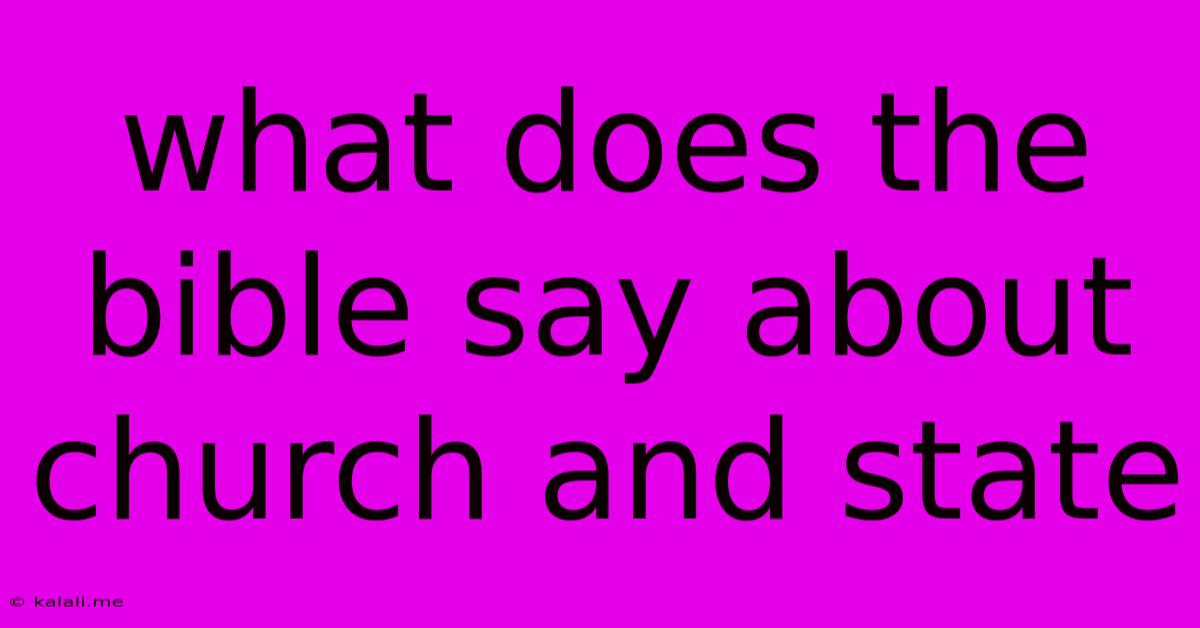What Does The Bible Say About Church And State
Kalali
May 29, 2025 · 3 min read

Table of Contents
What Does the Bible Say About Church and State? A Complex Relationship
The relationship between church and state is a complex and often debated topic, with varying interpretations drawn from biblical texts. There's no single, easily quotable verse that definitively settles the matter. Instead, understanding the biblical perspective requires examining different passages and considering the historical context in which they were written. This article explores the key biblical principles that inform the discussion of church and state separation, acknowledging the nuances and varied interpretations.
Key Biblical Principles and Their Interpretations:
The Bible doesn't directly address a modern concept like "separation of church and state" as we understand it today. However, several principles within scripture are used to support various perspectives on the issue:
1. Render Unto Caesar: The famous saying from Matthew 22:21, "Render therefore unto Caesar the things which are Caesar's; and unto God the things that are God's," is frequently cited. This verse suggests a distinction between earthly authority (Caesar) and spiritual authority (God). Many interpret this as a call for a division of responsibilities, with the state focusing on secular matters and the church on spiritual matters. However, the exact nature and extent of this division remain a subject of ongoing debate.
2. Submission to Governing Authorities: Romans 13:1-7 instructs Christians to submit to governing authorities, as these authorities are ordained by God. This passage is often interpreted as a call for obedience to the law, even if specific laws conflict with personal conscience. However, it’s important to note that this submission is not absolute; biblical history shows instances of defiance against unjust rulers. The line between obedience and civil disobedience remains a significant point of contention.
3. The Kingdom of God: The concept of the Kingdom of God, a central theme in Jesus' teachings, is often seen as distinct from earthly kingdoms. This suggests that the church's primary focus should be on spiritual matters and spreading the gospel, rather than seeking political power or direct involvement in governing. This interpretation underpins the argument for a distinct separation between religious and secular spheres.
4. Examples from the Old Testament: The Old Testament details a complex interplay between religious and political authority, particularly under theocratic rule in Israel. The kings were also religious leaders. This historical context shows that the relationship between church and state wasn’t always clearly separated, highlighting the evolution of the concept throughout history. However, even within this theocratic model, prophets frequently challenged unjust rulers, demonstrating the limitations of governmental authority and highlighting a commitment to moral and ethical principles over blind obedience.
Diverse Perspectives and Their Biblical Basis:
The biblical principles outlined above have been interpreted in diverse ways, leading to different views on the ideal relationship between church and state:
-
Strict Separation: This perspective emphasizes the "Render unto Caesar" passage and the distinct nature of the Kingdom of God, advocating for a complete separation of church and state to avoid corruption and undue influence.
-
Limited Interaction: This view acknowledges the need for some interaction between church and state, particularly in matters of morality and social justice. However, it emphasizes the church's primary focus on spiritual matters and the avoidance of entanglement in partisan politics.
-
Active Engagement: This perspective argues that Christians have a responsibility to engage in the political process and seek to influence society according to biblical values. This approach can be seen as a fulfillment of the call to be salt and light in the world.
Conclusion:
The Bible doesn't offer a simple, straightforward answer to the question of church and state. Instead, it provides a framework of principles that allow for various interpretations and approaches. The debate continues, reflecting the complexity of the issue and the evolving understanding of its implications in different historical and cultural contexts. Understanding the diverse interpretations and the biblical principles underpinning them is crucial for a nuanced discussion. Ultimately, the application of these principles is subject to ongoing theological reflection and practical engagement within the context of each community and nation.
Latest Posts
Latest Posts
-
How To Find Alpha Absolute Of A Wing
May 31, 2025
-
Cant Call Route After Id Nest Js
May 31, 2025
-
Water Coming Out Shower Head And Tub Spout
May 31, 2025
-
Should We Round Up The Defects Normal Probability
May 31, 2025
-
Youtube Number Of Videos Per Row
May 31, 2025
Related Post
Thank you for visiting our website which covers about What Does The Bible Say About Church And State . We hope the information provided has been useful to you. Feel free to contact us if you have any questions or need further assistance. See you next time and don't miss to bookmark.